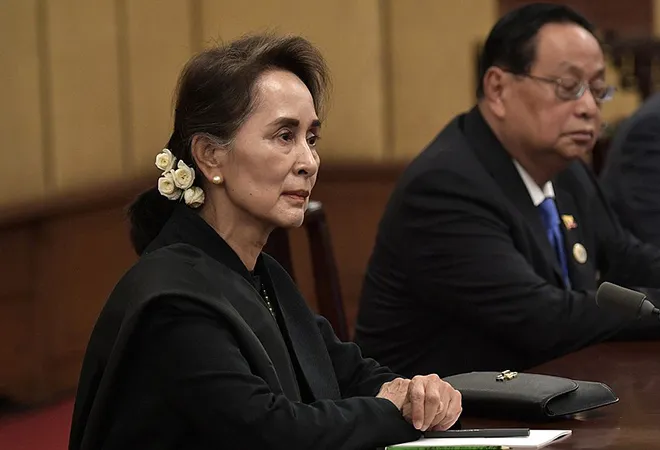
Myanmar’s Aung San Suu Kyi is leading a team of legal experts at the International Court of Justices’ (ICJ) trial against her country for mass murder, rape and destruction of the Rohingya minority. A complaint was lodged against Myanmar in the United Nations’ highest court by Gambia, a West African nation backed by the Organisation of Islamic Countries (OIC). The trial began on 10 December the day that is incidentally marked as International Human Rights Day.
Myanmar is mired in two legal cases (both filed in November) for prosecution of the Rohingya minority. Suu Kyi was named in a case by rights groups in Argentina under ‘Universal Jurisdiction’ for crimes against Rohingya minority. The ICJ complaint by Gambia follows the case in the Argentinean court. Would the Burmese State Counsellor’s presence at the trial be of any consequence to the outcome of the case?
Suu Kyi’s defence of ‘national interest’
Suu Kyi’s office has indicated that the State Counsellor would defend ‘national interest’ at Hague where the ICJ is located. Her representation at the ICJ is considered to be important as it is for the first time that her country faces legal scrutiny for its alleged atrocities against the Rohingya community. Suu Kyi is trying to impress upon her followers that she is Myanmar’s best bet at trial in Hague.
The leader possibly has a two-fold objective for representing Myanmar at the trial. One, she would depict the case against her country as a subject of national pride and galvanise nationalistic sentiments. She is turning an apparent embarrassing issue for her country into one that evinces pride and global reputation of Myanmar. With this, Suu Kyi hopes to consolidate her ruling party’s position in next year’s national elections.
Second, Suu Kyi by standing trial is messaging the world that despite a strong backlash from the international community, she holds her ground on the Rohingya issue. Earlier, amidst condemnation following the 2017 military operation targeting the Rohingyas, Suu Kyi had defended the military saying that her country does not fear international scrutiny and that it is for Myanmar to determine whether the allegations are based on evidence. But, then – the State Counsellor had refrained from attending the United Nations General Assembly in New York following the furore over Rohingya crisis.
The decision of the State Counsellor to represent Myanmar at the trial against her country at ICJ is a departure from her decision to keep away from international forums, especially UN meetings. Since the military operation in August 2017, Suu Kyi’s international visits have been largely confined to ASEAN+6 countries.
Myanmar’s legal recourse
Suu Kyi and the delegation of experts are likely to explain to the court that hearing the matter does not fall into its jurisdiction. She will also attempt to convince the court that the 2017 military operation was against Arakan Rohingya Solidarity Association (ARSA), a terrorist outfit and not the community and her government is adequately investigating if any excesses were carried out by the military during or after the August 2017 military operation.
Meanwhile, Chinese Foreign Minister, Wang Yi visited Myanmar and met with President Win Myint and State Counsellor, Suu Kyi on 7 December. The visiting Chinese minister in all likelihood discussed the impending case that Myanmar faces trial in ICJ. It must be remembered that. China along with Russia and eight more countries opposed a resolution put forward in the United Nations General Assembly urging Myanmar to end a military campaign against the Rohingyas and appoint a UN Special Envoy.
At the court in Hague, the prosecution would be led by spirited Gambian Minister, Abubacarr Tambadouis who has spent nearly a decade, investigating the Rwandan genocide. Tambadouis was part of the OIC delegation that visited Rohingya camps in 2017 in Cox’s Bazar district of Bangladesh that has the highest concentration of Rohingya refugees since they fled Rakhine state in Western Myanmar and bordering Bangladesh.
Suu Kyi’spolitical rhetoric and her presence lend moral support to the legal delegation of Myanmar at ICJ trial. Her representation appears to be weighing more on the political balance rather than on the balance of justice at the court trial in Hague.
The views expressed above belong to the author(s). ORF research and analyses now available on Telegram! Click here to access our curated content — blogs, longforms and interviews.




 PREV
PREV


